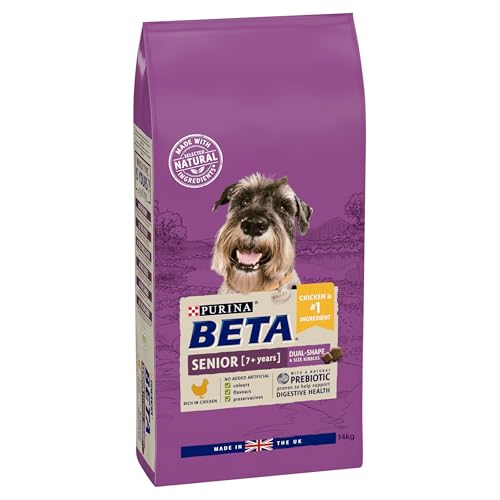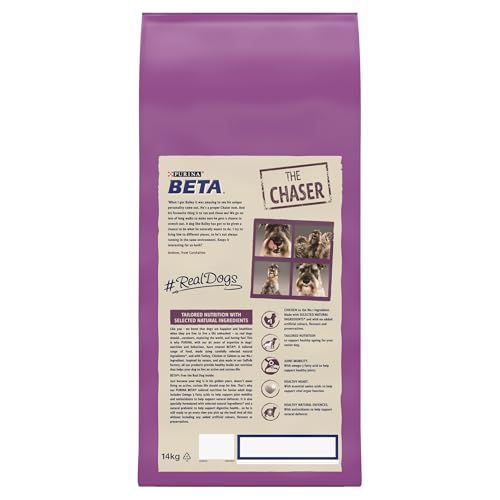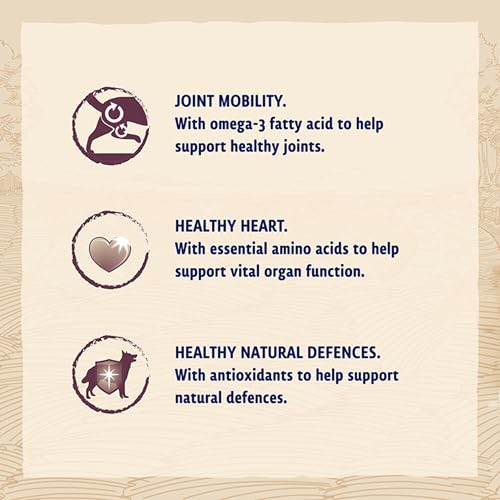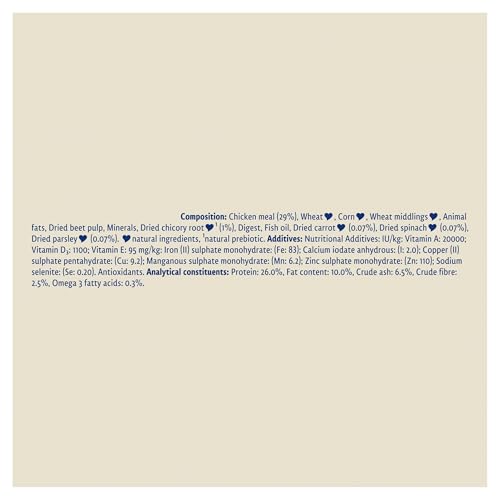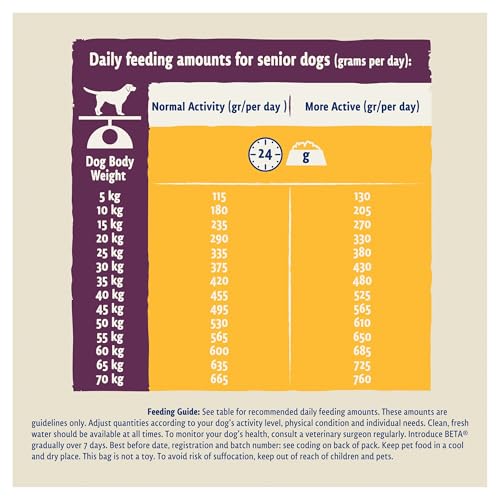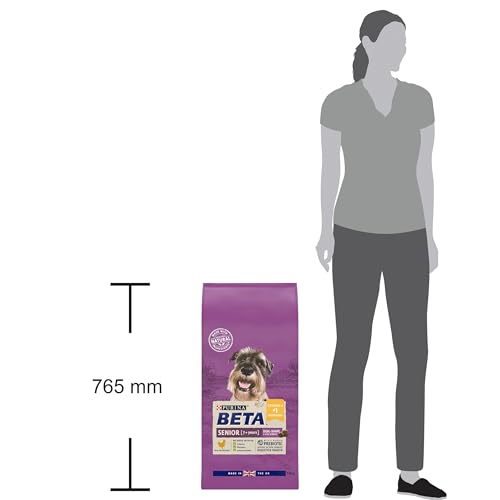

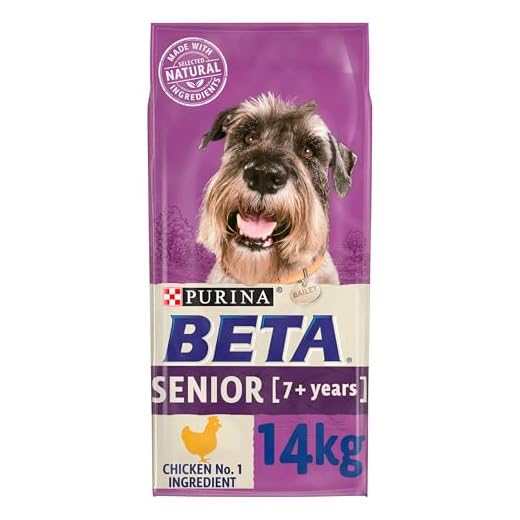


As a dedicated dog owner, I’ve always strived to provide the best care for my furry companions. When my small dog reached her senior years, I quickly realised that her nutritional needs were changing. The food that once gave her boundless energy and kept her coat shiny no longer seemed to have the same effect. It was clear that she needed a diet tailored to her mature stage of life. This prompted me to delve deep into the world of senior dog nutrition, specifically focusing on what’s best for small breeds.
Choosing the right dog food for a mature small dog can be overwhelming. The market is flooded with numerous brands and formulas, each claiming to be the best. However, not all dog foods are created equal, and it’s crucial to find a product that addresses the specific health concerns of older small dogs. These concerns often include weight management, joint health, and dental care. Through my research and consultations with veterinarians, I’ve gathered valuable insights on what to look for in senior dog food.
In this article, I will share my findings and recommendations based on personal experience and expert advice. We’ll explore the essential nutrients that mature small dogs require, how to interpret ingredient lists, and which brands have proven to deliver on their promises. By the end, you’ll have a clearer understanding of how to ensure your senior dog receives the nutrition they need to thrive in their golden years. Your little companion has given you so much joy and loyalty; now it’s time to return the favour by making informed choices about their diet.
Why Selecting the Proper Diet for Older Small Dogs Matters
When it comes to our furry friends, ensuring they receive the appropriate nutrition is paramount, especially as they age. Mature small dogs have unique dietary needs that differ significantly from those of younger pups or larger breeds. Choosing the right food can greatly impact their overall health, longevity, and quality of life.
As small dogs grow older, their metabolism slows down, and they become more prone to various health issues such as obesity, dental problems, and joint pain. Providing them with food specifically formulated for their age and size can help manage these issues and maintain their vitality. It’s not just about feeding them; it’s about giving them the nutrients they need to thrive in their golden years.
The Importance of Tailored Nutrition
Addressing Specific Health Concerns: Older small dogs often encounter specific health challenges that require tailored nutrition. For instance, they may need lower-calorie food to prevent weight gain or ingredients that support joint health to alleviate arthritis symptoms. Specially designed foods can include added vitamins and minerals that cater to these particular needs, ensuring your dog stays healthy and active.
Digestive Health: As dogs age, their digestive systems can become more sensitive. High-quality food designed for mature small dogs typically includes easily digestible ingredients and added fibre, which can promote better digestion and regular bowel movements. This can prevent discomfort and improve their overall wellbeing.
Providing the correct diet for older small dogs also supports dental health. Many senior dog foods are formulated to help reduce plaque and tartar buildup, which is crucial since dental issues are common in ageing dogs. Maintaining good dental hygiene through proper diet can prevent pain and infections, enhancing your dog’s comfort and health.
- Energy Levels: Appropriate nutrition helps maintain your dog’s energy levels, allowing them to stay playful and engaged. Balanced diets with the right mix of proteins, fats, and carbohydrates ensure they have sustained energy throughout the day.
- Immune System Support: Senior dog foods often contain antioxidants and other immune-boosting nutrients that help older dogs fend off illnesses. A robust immune system is vital for keeping your pet healthy as they age.
- Skin and Coat Health: The right nutrients also contribute to a shiny coat and healthy skin. Ingredients like omega-3 and omega-6 fatty acids are often included in senior dog food formulas to support skin and coat condition.
In conclusion, selecting the appropriate food for mature small dogs is crucial for managing their specific health needs, enhancing their quality of life, and ensuring they remain happy and healthy in their senior years. By providing a diet tailored to their unique requirements, we can help our beloved pets enjoy their later years to the fullest.
Key Nutritional Needs of Senior Small Dog Breeds
As our small dogs grow older, their nutritional requirements change. It’s crucial to adjust their diet to ensure they continue to thrive in their golden years. Having spent years with my little companion, I’ve realised that a senior small dog needs a diet specifically tailored to address age-related health concerns.
Senior small dog breeds often face issues such as reduced energy levels, joint problems, and dental health concerns. To support their overall wellbeing, it’s important to include certain key nutrients in their diet that cater to these specific needs.
Essential Nutrients for Ageing Small Dogs
One of the most critical components of a mature dog’s diet is protein. As dogs age, their muscle mass tends to decrease, which can lead to weakness and reduced mobility. High-quality protein sources help maintain muscle mass and provide the energy needed for daily activities.
Another important aspect is fibre. Older dogs often experience digestive issues, and a diet rich in fibre can promote healthy digestion. This helps in maintaining regular bowel movements and preventing constipation, which is common in senior dogs.
Joint health becomes a major concern as dogs age. Ingredients such as glucosamine and chondroitin are beneficial for maintaining joint flexibility and reducing the risk of arthritis. Including these in your dog’s diet can significantly improve their quality of life.
Dental health is also crucial. Senior dogs are prone to dental issues, which can lead to more serious health problems if not addressed. Feeding them kibble that promotes dental health or incorporating dental chews can help keep their teeth clean and gums healthy.
Lastly, ensuring a balanced intake of vitamins and minerals is vital. Nutrients like vitamins E and C, as well as omega-3 fatty acids, are essential for boosting the immune system and promoting a shiny coat. These antioxidants help combat the effects of ageing and keep your senior dog looking and feeling their best.
- Protein: Maintains muscle mass and energy levels
- Fibre: Promotes healthy digestion and prevents constipation
- Glucosamine and Chondroitin: Supports joint health and flexibility
- Dental Care: Prevents dental issues and maintains oral health
- Vitamins and Minerals: Boosts immune system and promotes a healthy coat
Understanding these specific nutritional needs can help us make informed decisions when selecting food for our senior small dog breeds. By paying close attention to their diet, we can ensure they remain healthy and happy throughout their senior years.
Essential Ingredients for Senior Dog Food
As our small dogs age, their dietary needs evolve. It becomes crucial to provide them with nutrition that supports their changing bodies and helps them maintain their health and vitality. Knowing what ingredients to look for in food for mature dogs can make a significant difference in their well-being.
When selecting food for a senior dog, it’s important to focus on components that address common age-related issues. High-quality ingredients not only help in maintaining energy levels but also in supporting joint health, digestive function, and a strong immune system. Below are some key ingredients that are particularly beneficial for older small dogs.
Key Ingredients for Optimal Senior Dog Health
-
High-Quality Protein: Protein is vital for maintaining muscle mass, which tends to decrease with age. Look for sources like chicken, turkey, and fish, which are easily digestible and provide essential amino acids.
-
Healthy Fats: Omega-3 and Omega-6 fatty acids are crucial for maintaining a healthy coat and skin. They also have anti-inflammatory properties that can benefit joint health. Fish oil and flaxseed are excellent sources of these fats.
-
Fibre: As dogs age, their digestive systems can become less efficient. Fibre from sources like sweet potatoes, pumpkin, and brown rice helps to ensure regular bowel movements and can prevent constipation.
-
Antioxidants: Senior dogs can benefit from a diet rich in antioxidants, which help to combat free radicals and support the immune system. Ingredients like blueberries, cranberries, and spinach are rich in antioxidants.
-
Glucosamine and Chondroitin: These are essential for joint health, helping to maintain cartilage and reduce the symptoms of arthritis. Look for foods that include these supplements to support your dog’s mobility.
Choosing the right food for your ageing small dog involves more than just selecting any senior dog food. Paying attention to these specific ingredients can make a significant difference in your pet’s quality of life. Always consult with your vet to tailor the best diet plan for your dog’s specific needs.
Common Ingredients to Avoid in Dog Food for Older Dogs
When selecting food for our senior small dogs, it’s essential to be cautious about the ingredients. Older dogs have specific dietary needs and certain common components in dog food can be harmful to their health. Being aware of these ingredients helps in making informed decisions for their diet, promoting better health and longevity.
Understanding what to avoid in dog food can prevent various health issues such as obesity, allergies, and digestive problems. With a mindful approach, we can ensure our senior furry companions get the nutrition they need without harmful additives.
Ingredients to Steer Clear Of
- Artificial Preservatives: Ingredients like BHA, BHT, and ethoxyquin are commonly used to extend the shelf life of dog food. However, these chemicals can lead to serious health problems, including cancer and liver issues. Opt for natural preservatives like vitamin E and vitamin C instead.
- Artificial Colours and Flavours: These additives are used to make the food look and taste better to humans, but they have no nutritional value for dogs. They can also cause allergic reactions and behavioural problems.
- By-Products and Fillers: Meat by-products and fillers like corn, wheat, and soy are often included in dog food to cut costs. These ingredients provide minimal nutritional benefits and can be hard for older dogs to digest, leading to gastrointestinal issues.
- Excessive Sodium: High levels of sodium can be harmful, especially for older dogs with heart or kidney conditions. Always check the sodium content and opt for low-sodium options when possible.
- Rendered Fat: This ingredient is added to enhance the flavour, but it can be a source of harmful toxins. It is better to choose dog food with clearly labelled fat sources like chicken fat or fish oil.
- Sweeteners: Ingredients like corn syrup, sugar, and xylitol should be avoided as they contribute to obesity and can lead to diabetes. Senior dogs particularly need a diet low in sugar to maintain a healthy weight.
By avoiding these harmful ingredients, we can help ensure our senior small dogs enjoy a healthier, more comfortable life. Carefully reading labels and choosing high-quality, natural dog food options is a simple yet effective way to support their well-being.
Best Commercial Dog Food Brands for Mature Small Dogs
As a devoted dog owner, I understand how crucial it is to find the right food for our ageing small breed companions. Mature dogs have different nutritional requirements compared to their younger counterparts, and finding the perfect commercial dog food can make a significant difference in their health and vitality. Over the years, I have researched and tested various brands to ensure my furry friend gets the best possible diet.
There are several brands that stand out for their commitment to quality ingredients and balanced nutrition tailored for mature small dogs. In this guide, I’ll share my insights on a few noteworthy brands that have consistently delivered excellent results for my dog.
Recommended Brands for Mature Small Dogs
- Royal Canin
Royal Canin is well-known for its breed-specific formulas and attention to the unique needs of dogs at different life stages. Their small breed senior recipes are crafted with precise nutrient profiles to support joint health, maintain a healthy weight, and promote overall vitality. I’ve noticed that my dog’s coat looks shinier and she’s more energetic since switching to Royal Canin’s mature small dog formula.
- Hill’s Science Diet
Hill’s Science Diet offers a variety of options for senior dogs, focusing on balanced nutrition that includes antioxidants, vitamins, and minerals. Their small bites formula is particularly suited for small breeds, ensuring easy digestion and nutrient absorption. My dog enjoys the taste, and I’ve observed improvements in her digestive health and energy levels.
- Blue Buffalo
Blue Buffalo’s Life Protection Formula is another excellent choice, featuring real meat as the first ingredient and including wholesome whole grains, vegetables, and fruit. Their senior dog recipes are enriched with glucosamine and chondroitin to support joint health, which is crucial for older dogs. Since incorporating Blue Buffalo into my dog’s diet, she has shown greater mobility and less stiffness in her joints.
- Nutro Ultra
Nutro Ultra provides a nutrient-dense blend of high-quality protein sources, superfoods, and antioxidants in their senior formulas. This brand focuses on clean eating, free from GMOs, corn, wheat, and soy. I’ve noticed that my dog’s overall health and vitality have improved, with better digestion and a more robust immune system since switching to Nutro Ultra.
Choosing the right food for your mature small dog can be a daunting task, but these brands have proven to deliver reliable and beneficial results. By prioritising quality ingredients and specialised nutrition, you can ensure your furry friend enjoys a healthy, happy, and active life well into their senior years.
Homemade Dog Food Recipes for Senior Small Dogs
As our furry companions age, their dietary needs change. Preparing homemade meals for mature small dogs can ensure they receive the necessary nutrients to stay healthy and active. I’ve found that creating my own dog food recipes allows me to tailor the ingredients to suit my dog’s specific needs, including managing any health issues that might arise with age.
Senior small dogs often require a diet lower in calories but rich in fibre, vitamins, and minerals. It’s essential to focus on high-quality proteins, easily digestible carbohydrates, and healthy fats. Here, I’ll share some of my favourite homemade recipes that have worked wonders for my ageing pup.
Nutritious Homemade Recipes
1. Chicken and Rice Delight
- Ingredients:
- 2 cups of cooked brown rice
- 1 pound of boiled, shredded chicken breast
- 1/2 cup of diced carrots
- 1/2 cup of peas
- 1 tablespoon of olive oil
- Instructions:
- Cook the brown rice according to the package instructions.
- In a large pot, combine the cooked rice, shredded chicken, carrots, and peas.
- Stir in the olive oil and mix well.
- Allow the mixture to cool before serving to your dog.
2. Beef and Vegetable Medley
- Ingredients:
- 1 pound of lean ground beef
- 1 cup of cooked quinoa
- 1/2 cup of finely chopped spinach
- 1/2 cup of grated sweet potato
- 1 tablespoon of fish oil
- Instructions:
- Brown the ground beef in a skillet, then drain any excess fat.
- In a large bowl, combine the beef, cooked quinoa, spinach, and sweet potato.
- Add the fish oil and mix thoroughly.
- Let it cool before serving to your dog.
3. Turkey and Pumpkin Feast
- Ingredients:
- 1 pound of ground turkey
- 1 cup of canned pumpkin (not pie filling)
- 1/2 cup of chopped green beans
- 1/2 cup of rolled oats
- 1 tablespoon of flaxseed oil
- Instructions:
- Cook the ground turkey in a skillet until fully done.
- In a pot, mix the turkey, pumpkin, green beans, and rolled oats.
- Stir in the flaxseed oil and blend well.
- Allow the food to cool to room temperature before serving.
These recipes have helped me ensure my senior small dog maintains a balanced diet tailored to his needs. By preparing meals at home, I can monitor the quality of ingredients and avoid unnecessary additives. It’s a labour of love that pays off in seeing my dog’s continued health and happiness.
How to Transition Your Dog to Senior Dog Food
When our furry companions start to age, their dietary needs evolve. Introducing your mature small dog to senior-specific food can support their health and vitality. Transitioning their diet should be a careful and gradual process to avoid upsetting their digestive system.
Understanding the specific needs of older dogs is crucial. Senior dog food is formulated to address changes such as decreased activity levels, joint issues, and different nutritional requirements. Here’s how you can smoothly transition your dog to senior food.
Step-by-Step Guide to Transitioning Your Dog’s Diet
1. Gradual Introduction: Start by mixing a small amount of the new senior food with your dog’s current food. A good ratio to begin with is 25% new food and 75% old food. Over the next week, gradually increase the proportion of senior food while decreasing the amount of their current food.
2. Monitor Your Dog’s Reaction: Pay close attention to your dog’s behaviour and digestion during the transition. Look for signs of gastrointestinal upset, such as diarrhoea, vomiting, or a loss of appetite. If any of these symptoms occur, slow down the transition process and give their digestive system more time to adjust.
- Week 1: 25% new food, 75% current food
- Week 2: 50% new food, 50% current food
- Week 3: 75% new food, 25% current food
- Week 4: 100% new food
3. Consistency is Key: Maintain a consistent feeding schedule. Older dogs benefit from regular meal times, which can aid digestion and improve overall well-being. Avoid feeding table scraps or too many treats during the transition to prevent any additional strain on their digestive system.
4. Hydration: Ensure your dog has constant access to fresh water. Senior dogs might need more water, especially if the new food is dry kibble. Proper hydration supports digestion and helps prevent urinary issues.
Transitioning your dog to senior food doesn’t have to be stressful. By taking it slow and paying attention to your dog’s needs, you can help them adjust smoothly to their new diet, ensuring they remain happy and healthy in their golden years.
Tips for Maintaining a Healthy Diet for Your Mature Small Dog
As your small dog ages, maintaining a healthy diet becomes increasingly important to ensure their overall well-being and longevity. Here are some essential tips to help you keep your mature small dog on a nutritious diet:
- Consult Your Veterinarian: Before making any changes to your dog’s diet, consult with your veterinarian. They can provide personalized recommendations based on your dog’s age, health status, and specific dietary needs.
- Choose Quality Ingredients: Opt for dog foods that contain high-quality ingredients, such as real meat (e.g., chicken, turkey, or lamb), whole grains, and vegetables. Avoid foods with excessive fillers, artificial additives, or preservatives.
- Consider Senior Formulas: Many pet food brands offer specific formulas tailored to senior dogs. These formulas often contain lower calories, joint-supporting nutrients, and ingredients that promote cognitive health.
- Monitor Portion Sizes: Pay attention to your dog’s portion sizes to prevent overfeeding or underfeeding. Follow feeding guidelines provided by the food manufacturer and adjust portions based on your dog’s activity level and weight.
- Provide Adequate Hydration: Always ensure that your dog has access to fresh and clean water throughout the day. Hydration is crucial for maintaining healthy organ function and overall vitality.
- Offer Nutritious Treats: When giving treats, choose healthy options like small pieces of fruits (e.g., apple or banana) or vegetables (e.g., carrots or green beans) instead of high-calorie, low-nutrient treats.
- Regular Exercise: Incorporate regular exercise into your dog’s routine to help maintain a healthy weight, promote muscle strength, and support joint health. Consult your vet for appropriate exercise recommendations based on your dog’s age and fitness level.
- Monitor Health Changes: Keep an eye out for any changes in your dog’s appetite, weight, energy levels, or bathroom habits. These changes could indicate underlying health issues that require attention.
By following these tips and working closely with your veterinarian, you can ensure that your mature small dog enjoys a balanced and nutritious diet, leading to a happier and healthier life.
Best Dog Food For Mature Small Dogs
Features
| Size | 7.5 kg (Pack of 1) |
Features
| Part Number | 8710255121390 |
| Model | 8710255121390 |
| Color | transparent |
| Release Date | 2013-10-18T00:00:01Z |
| Size | 12 kg (Pack of 1) |
| Language | English |
Features
| Part Number | 12231689 |
| Model | 12531980 |
| Color | transparent |
| Release Date | 2014-05-23T00:00:01Z |
| Size | 1 count (Pack of 1) |
Features
| Part Number | HARRTV-15 |
| Model | HARRTV-15 |
| Color | Turkey |
| Is Adult Product | |
| Size | 15 kg (Pack of 1) |
| Language | English |
Features
| Part Number | HARRLR-18 |
| Model | HARRLR-18 |
| Color | Lamb |
| Release Date | 2019-10-17T00:00:01Z |
| Size | 18 kg (Pack of 1) |
| Price history for Harringtons Lamb & Rice Dog Food | |
|---|---|
|
Latest updates:
|
|
Features
| Is Adult Product | |
| Release Date | 2025-05-17T00:00:01Z |
| Language | English |
| Number Of Pages | 213 |
| Publication Date | 2025-05-17T00:00:01Z |
Features
| Part Number | 12274093 |
| Model | TP-7613035152908_Vendor |
| Release Date | 2015-08-24T00:00:01Z |
| Size | 11 kg (Pack of 1) |
| Language | Spanish |
| Price history for PRO PLAN Veterinary Diets Dry Food | |
|---|---|
|
Latest updates:
|
|
Q&A:
What is the best dog food for mature small dogs?
The best dog food for mature small dogs typically includes high-quality protein sources like chicken, turkey, or fish. Look for options specifically formulated for senior dogs, as they often contain nutrients like glucosamine and chondroitin for joint health.
How can I choose the right dog food for my mature small dog?
Consider factors like your dog’s age, activity level, and any specific health concerns. Opt for a dog food with real meat as the first ingredient, avoid artificial additives, and consult with your vet for recommendations tailored to your dog’s needs.


















